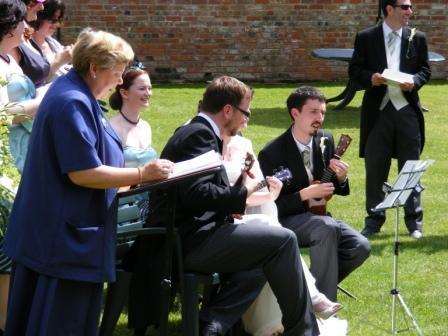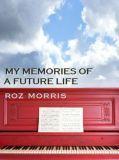Too much information – be gentlemanly with your research

As it's their wedding they can be forgiven
I just read The Fear Index by Robert Harris. Much of the derring-do is in the world of hedge funds. Hedge funds make me feel baffled and not a little cross. Mercifully, Harris is a great storyteller – which means he knows that already.
Instead of baffling us, Harris starts with characters in a situation we can relate to – a man with a mysterious intruder in his house. A good half of the book passes before the reader ever has to grapple with how a hedge fund actually works. When we do it's a terrific scene – a flashback to how the main characters met, so we want to read it. It's full of entertaining characterisation – a racy rogue explains to an introverted scientist that it's like betting on whether the girl at the fridge is wearing black underwear.
If you know about hedge funds, it's charming enough that you forgive it being explained so basically. If you don't, you see a bit of character interaction and emerge smugger and wiser.
Setting overload
So many novels derive much of their atmosphere and story from the setting. Whether it's historical, sci-fi, fantasy, mountaineering, SAS thrillers (or even the world of classical music like My Memories of a Future Life). A lot of the fun of a book like this is the feeling you've had an insider view. But it's easy to overdo the details. Especially if some of your story hinges around something as intricate as how hedge funds work.
I see a lot of novels that judge this wrong. Research-dumps, screeds of stodgy exposition that the writer mistakes for scene-setting. It's clear that the writer has done admirable amounts of legwork – but they then frogmarch the reader through it too.
This not only holds up the story, it puts the reader on the outside while things are explained to them. In fact, you want them on the inside, immersed in the world as though the distinctive details were a natural part of life.
Wear it lightly
Harris clearly understands that however heavily he has to research, the novel should wear it lightly.
His other thrillers tackle ancient Rome (Imperium, Pompeii, Lustrum), the 1940s wartime code-breaking centre Bletchley Park (Enigma) an alternate 1960s (Fatherland) – to name but a few. They are full of intricate world-building – but he translates them into pressures on characters that generate stories. At the same time, you never feel you're struggling to understand, or patronised because he's gone too simple. It's as if when he sat down to write he tried to say as little as possible about what he knew – and put the story and character first.
In your handling of research you have to be like the definition of a gentleman – a man who knows how to play the banjo but refrains from doing so.
Which authors do you think are gentlemanly with research?
 How to write a novel – in-depth webinar series with Joanna Penn of The Creative Penn, starting November. Find more details and sign up here.
How to write a novel – in-depth webinar series with Joanna Penn of The Creative Penn, starting November. Find more details and sign up here.
Nail Your Novel
– my short book about how to write a long o
 ne
– i
s available from Amazon. Not too late to nab a Kindle copy if you're
aiming to be a Wrimo!
ne
– i
s available from Amazon. Not too late to nab a Kindle copy if you're
aiming to be a Wrimo!
My Memories of a Future Life is now available in full. You can also listen to or download a free audio of the first 4 chapters over on the red blog.


 [image error]
[image error]

 [image error]
[image error]
[image error]
[image error]



